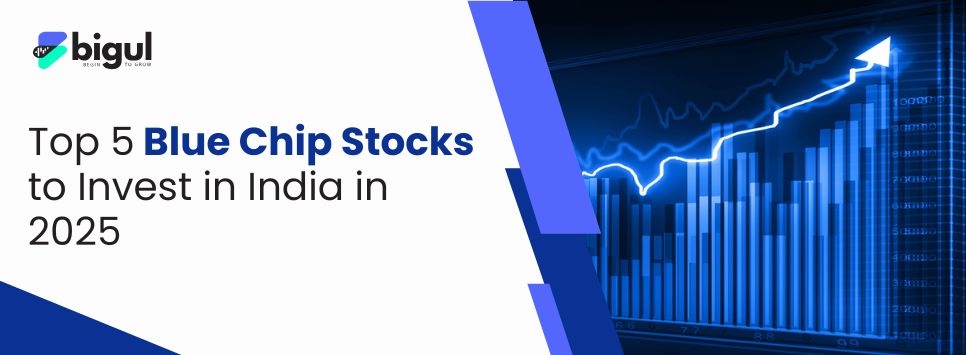What Are Bluechip Stocks?
Bluechip stocks represent shares in large, financially robust companies with established histories of stable earnings, strong brand recognition, and leadership in their respective industries.
The term Blue chip originated from the highest value chips in poker. Stocks like Reliance or HDFC Bank are typically bluechip stocks. These stocks exhibit resilience in the economy.
In India, these bluechip companies are the best performers in index funds such as Nifty 50 and sometimes their market capitalisation is more than 50,000 crores. Some of the most important features of these bluechip stocks are; low volatility, consistent shareholder profits and resiliency to market swings since they have diversified revenue streams and sound business judgment. To the investors, they are an anchor asset and they balance the risk and reward measure.
Let's understand why Bluechip stocks are better for steady, long-term growth.
Why Invest in Blue-Chip Stocks?
Blue-chip stocks have attractive benefits to both novice and experienced investors. Bluechip companies are usually debt-free companies that have a low to zero likelihood of going Bankrupt and safeguard capital when the market struggles. Meanwhile, these stocks tend to provide regular dividend income, which aids in multiplying or compounding your wealth in the long run.
Bluechip stocks India also have a very low correlation with small-cap volatility, which helps enhance your portfolio diversification. Historically, these blue-chip stocks have delivered steady long-term growth; for instance, Bajaj Finance generated 188.60% returns over five years.
Moreover, their blue-chip stock India pricing provides them with an inflation hedge through which they can transfer increased costs to consumers and still make good margins. Lastly, learning What Are Blue chip stocks and how they work provide an edge to the investors.
Lets see the Top 5 Blue chip companies in India and how they work
Top 5 Bluechip Stocks to Look For in 2025
1: Reliance Industries Ltd
Guided by Reliance Industries CEO Mukesh Ambani’s visionary leadership, Reliance has been transformed to the largest bluechip company in India.. When you glance at the Reliance Share Price, currently hovering around Rs1,495( July 11, 2025)it’s more than just a number; it reflects the trust millions of investors place in Ambani’s ability to reinvent the company decade after decade. That staggering Reliance Market Cap of Rs 20.23 lakh crore? It’s a testament to how a textile startup transformed into a global powerhouse, touching everything from fuel pumps to smartphones.
The latest Reliance Industries Financials tell an inspiring story – hitting record annual revenue of nearly Rs 10 lakh crore in FY2025 isn’t just corporate jargon. It’s the result of real people running 12,800+ neighbourhood stores, engineers rolling out 5G networks that connect villages, and scientists developing green energy solutions. Even during global uncertainty, the Reliance Share Price holds steady because families still shop at Reliance Retail, students attend online classes through Jio, and factories rely on their energy division. For shareholders watching those Reliance Industries Financials, it’s proof that betting on Mukesh Ambani’s leadership as Reliance Industries CEO means investing in India’s own growth story.
2: Asian Paints Ltd: Painting India’s Growth Story
When you think of transforming a house into a home in India, Asian Paints colors the imagination of millions. This long-term trust has created a Asian Paints market cap of 2.34 lakh crore and turned this company into a bluechip comapny. Leading this legacy is Asian Paints CEO Amit Syngle whose 30-year association with the company has been part of its growth story of transforming itself into a home solutions offerer.
Asian Paints financials also highlight strategic wins: the home décor division now contributes 29% to revenue as families embrace their bathware, lighting, and furnishings. When homeowners choose an Asian Paints curtain or faucet, they’re voting for a vision championed by the Asian Paints CEO—one where walls are just the starting point for beautiful living spaces.
What truly humanizes the Asian Paints share price stability is its invisible ubiquity. From the apartments of Mumbai to village haats, its 150,000+ retailer network employs local entrepreneurs. Syngle’s focus on water conservation (replenishing 478% of usage) and renewable energy (57.6% operations) shows responsibility beyond profits. The Asian Paints market cap thus represents more than financial value—it’s decades of coloring Diwali celebrations, newlyweds’ first homes, and the pride of small shop owners. For investors watching those Asian Paints financials, it’s a stake in enduring trust.
3: HDFC Bank: The Trusted Engine of India's Financial Aspirations
HDFC Bank share price of Rs1,983.70 isn't merely a number on a screen; it represents the collective faith of millions, from street vendors using QR payments to NRIs investing in homeland growth. These trust has transformed HDFC into one of the largest Bluechip companies in India.
It is this trust that has created an insurmountable HDFC bank market cap of rupees 15.21 lacs crores to not only make the company the leader in the banking industry of India but also an international giant that stands toe-to-toe with the Wall Street giants in terms of size and strength.
Steering this financial ecosystem is HDFC Bank CEO Sashidhar Jagdishan, whose 25-year journey from risk manager to visionary captain embodies the bank's ethos of "banking with human touch."
The recently unveiled HDFC Bank financials tell a story of resilience meeting ambition—FY2025 revenue surged to Rs3.36 lakh crore while profits touched Rs73,440 crores, achievements forged during challenging economic times. These HDFC Bank financials glow brighter when you see them reflected in everyday life: the small business owner securing a lightning-fast loan, the college student opening her first savings account, or the farmer receiving crop insurance within minutes on his feature phone. Much of this accessibility stems from Jagdishan's leadership as HDFC Bank CEO, particularly after the historic HDFC Ltd merger that created housing opportunities for 2.3 million families last year alone.
What makes the HDFC Bank share price truly meaningful is how it mirrors India's financial democratisation. While the towering HDFC Bank market cap catches headlines, it's built on countless quiet moments—the pensioner smiling at 7% fixed deposit returns, the village teenager trading stocks through the PayZapp platform, or the corporate client executing cross-border payments before breakfast. For investors, these HDFC Bank financials represent more than metrics; they're stakes in a future where banking dissolves barriers.
4: Avenue Supermarts: The Everyday Revolution in Indian Retail
Enter any DMart store on a busy Sunday and you will experience the pulse of the Indian trading revolution, families trundling carts with high-quality well priced goods, cashiers working their wires with the speed of light and the silent buzz of efficiency that makes every penny count.
Avenue supermarts share price of Rs 4064.20 is not only a metric in terms of finance but is also an indicator of the faith that millions of people felt in reaching to the status of DMart Ready as the slogan of the household. Such shared belief has constructed an Avenue Supermarts current market cap of 2.64 lakh crore.
Guiding this everyday miracle is Avenue Supermarts CEO Ignatius Navil Noronha, whose obsession with "lean operations" since 2017 has redefined how India shops.
Recent Avenue Supermarts financials reveal why this retailer defies economic gravity—revenue surged to Rs61,649 crores while profit hit Rs2,707 crores, numbers that mirror the smiles of customers saving 15-20% on monthly groceries. These Avenue Supermarts financials glow brighter when you witness Noronha's philosophy in action: the warehouse-style stores minimizing décor costs, the inventory systems restocking bestsellers within hours, and the staff trained to help rather than upsell. Under the Avenue Supermarts CEO's leadership, DMart has become India's inflation shield, where middle-class budgets stretch further without compromising quality.
While the soaring Avenue Supermarts market cap impresses analysts, it's built on countless small victories—the college student buying affordable stationery, the grandmother finding diabetes-friendly snacks, or the young couple furnishing their first apartment without debt.
5: Tata Consultancy Services: Weaving Technology into India’s Growth Fabric
When you use a bank’s mobile app, pass through an automated toll booth, or even track a package globally, there’s a quiet chance Tata Consultancy Services (TCS) is the invisible hand enabling that experience. Today, the TCS share price of Rs3,266 isn’t merely a digit on a screen—it’s a reflection of the trust millions place in a homegrown titan that powers 45% of the world’s Fortune 500 companies . That collective confidence has built a monumental TCS market cap of Rs11.82 lakh crore, making it not just India’s IT crown jewel but a global top-five IT services brand . Steering this digital odyssey is TCS CEO K. Krithivasan, or "Krithi" as colleagues call him—a 34-year TCS veteran who rose from assistant system analyst to CEO by mastering a simple mantra: "Technology succeeds only when it solves human problems" .
The latest TCS financials reveal why this engineer’s philosophy resonates. FY2025 revenue climbed to Rs255,324 crores while profits reached Rs48,797 crores—numbers that gain meaning when you witness their impact . Picture a farmer in Punjab checking crop prices on a TCS-built app, a German auto plant using their AI-powered Ignio™ software to prevent assembly line breakdowns, or a Tokyo banker trading securely on the TCS BaNCS™ platform . Under TCS CEO Krithi’s leadership, these innovations aren’t isolated projects; they’re threads in a global tapestry connecting 606,998 employees across 55 countries.
What truly humanizes the TCS share price stability is its democratic generosity. While the towering TCS market cap draws headlines, it’s built on empowering ordinary investors through 94% dividend payouts and Rs134.20 annual EPS. For shareholders, these TCS financials represent more than metrics; they’re stakes in a legacy where 52.4% return on equity fuels both prosperity and purpose.
Conclusion:
Blue chip stocks are investments but more than that they are the core of the finances of millions of people. All the five giants we have discussed- Reliance Industries, Asian Paints, HDFC bank, Avenue Supermarts, and TCS are the perfect example of why the Bluechip companies are boundless generators of wealth.
When exploring blue chip stocks, recognise they're not mere tickers but institutional pillars—companies with decades of profit growth, minimal debt, and governance that withstands economic monsoons. The Bluechip stocks India market uniquely offers exposure to global giants rooted in local soil, where Rs20 lakh crore conglomerates serve neighbourhood kiranas. For those new to blue chip stocks are, remember: their true magic lies in compounding during crises. When markets tumble, these firms don't just survive—they acquire competitors and innovate, as Reliance did during the 2020 lockdown with JioMart.
The Bluechip stocks India landscape is particularly compelling now. With India's GDP sprinting toward $5 trillion, these companies act as economic accelerators—TCS skilling youth for the AI era, HDFC financing micro-entrepreneurs, and Asian Paints uplifting rural retailers. While volatility will come, history shows blue chip stocks reward patience: Rs1 lakh invested in DMart's 2017 IPO would be Rs9.4 lakh today. As you build your portfolio, let these Bluechip companies be your anchors—proving that slow, steady, and brilliant often wins the wealth race.
FAQ for Beginners
1. What are blue chip stocks and why are they good for beginners?
Blue chip stocks in India are those, whose financial performance is good. Because they are stable and bear regular dividends with fewer volatility, they are good investments when one gets started. These Bluechip companies which have a history of surviving during economic crises and have been giving stable returns in the long run.
2. How much money do I need to start investing in blue chip stocks?
You can start investing in blue chip stocks with relatively small amounts, as most brokers now offer fractional shares. However, since blue chip stocks typically have higher share prices, you might need Rs1,000 to Rs5,000 to buy full shares of some companies
3. Are blue chip stocks in India a safe investment?
There is no risk-free investment and blue chip stocks India are regarded as one of the safest equity products. They are less volatile, have good financial status, and well planned business models that cushion them in the event of economic recession.
4. What's the difference between blue-chip stocks India and small-cap stocks?
The blue chip stocks are shares of big and established firms which normally feature a market capitalization of more than Rs10 billion whereas the small cap stocks are that of the smaller firms and the market capitalization of these stocks is between Rs250 million to Rs2 billion. Blue chips are more stable and more regular in dividends whereas small-cap has greater growth opportunities but they are more risky and volatile.
5. How often should I review my blue chip stock investments?
Long-term investors are not always required to check the investment in blue chip stocks on the quarterly or semi-annual basis. Nevertheless, there are some things you should be aware of company fundamentals, quarterly earnings, and any big business developments that could impact your intrinsic investment idea.

.jpg)

.jpg)




.jpg)


